Al-Zaytouna Centre for Studies and Consultations held a panel discussion entitled: “The Role of Regional Think Tanks in the Decision Making Process: The Palestine Issue as an Example,” on 30/1/2018, where a number of heads of think tanks concerned with the Palestine issue attended.
This was a “Why Think Tanks Matter” Event, part of the launch of the 2017 Global Go To Think Tank Index report, joining other events hosted and organized by 160 organizations worldwide in over 100 cities. The report, conducted annually by the Think Tanks and Civil Societies Program (TTCSP) at the Lauder Institute, University of Pennsylvania, classifies more than 7,600 think tanks.
The discussion was kicked off by the General-Manager of al-Zaytouna Centre Dr Mohsen Mohammad Saleh, who welcomed the attendees and reviewed the Lauder Institute 2017 statistics on think tanks around the world, and their geographical distribution. Saleh stressed that the decision-making process is the most important part of think tanks work, pointing out that many research centers are inefficient in that aspect, and adding that think tanks to be effective should have sufficient information and the ability to analyze, compare, forecast, and offer methodological criticism.
Researcher Saqr Abu Fakhr covered the experience of both the Palestine Research Center and the Institute for Palestine Studies and their respective roles in Palestinian decision-making. Abu Fakhr said that the main motivation for them was to respond to the Zionist narrative, rather than influencing and advising Palestinian decision-makers. For the Palestinian leadership was unable, at the beginning of the revolution, to respond to the questions and ideas raised in Western conferences. Palestinian leadership was focused on the media more than on research centers, and as a result, much effort and academic research has been placed on the shoulders of independent researchers.
Hani al-Masri, Director General of the Palestinian Centre for Policy Research and Strategic Studies—Masarat, from Ramallah said that the lack of strategic thinking among Palestinians in general, and leaders and figures in particular, is a serious weakness faced by the Palestine issue. Decision makers fear any thinking or view which is incompatible with their views, decisions, and policies. Al-Masri called for the need not to succumb to frustration, and said that the Masarat Center realized that early and adopted a policy that influences the decision-making process, as well as influencing public opinion.
Dr Ahmed Atawna, Director of Vision for Political Development Centre, from Istanbul said that there is a real crisis between Palestinian think tanks and Palestinian decision makers due to different factors, some of which have to do with the decision makers, while others are related to the think tanks themselves. The former consider themselves authorized to make decisions without reference to think tanks, as they believe they possess information, which think tanks often lack, while the latter often suffer the multiplicity of subjects they deal with, which sometimes makes them lose the advantage of being specialized in certain fields. In addition, most think tanks tackle the same subjects, thus wasting efforts, leaving other subjects inadequately addressed. Atawna called on Palestinian think tanks to be specializee, and suggested that a number of Palestinian research centres prepare a joint strategic position assessment about a central issue that would go beyond political bias, and then submit it to the Palestinian leadership.
Researcher Walid Muhammad ‘Ali talked about his experience at Baheth Center for Palestinian and Strategic Studies, saying that the center’s objective was to study the Zionist issue and the role of Christian Zionism and Arab Zionists, and the need to be vigilant so as not to be exploited by others who would impose their agendas.
Researcher Mahmud Haidar talked about the importance of think tanks in formulating policies. He added that Palestinian study centres have been historically established for informational, tactical, and cultural purposes rather than policy-making purposes, and are influenced by funding and politicization.
The researcher at al-Zaytouna Centre Wael Saad highlighted the experience of Palestinian research centres and their great role in the Palestinian issue. He added that some Palestinian political elites leave research and strategic thinking to be part of the decision-making process, however when they retire they don’t return to the studies realm as in the case of their peers in Western countries.
Prof. Dr Talal ‘Atrissi spoke about the shortcomings of think tanks, saying that many study centres provide general analyses rather than anything specific and accurate to decision makers. He added that a state, which has a real project, establishes think tanks for planning and policy-making purposes, for example Iran, Turkey and Israel. However, funding is one of the main obstacles facing these centers, in addition to collecting information, which are often not available, especially with regard to writing an assessment of a situation. ‘Atrissi pointed out that decision makers depend on two things, none of which are think tanks; collecting information in their own ways, and foreign support. ‘Atrissi called for the study of the Israeli think tanks experience, because they are advanced in this area.
Researcher Suhail al-Natour highlighted the importance of staff competence and academic qualifications at study centres, while Ayman Zaidan spoke about the gap between political decision makers and think tanks in the Arab world, compared to the Western world. He added that sometimes there is a conflict of will between think tanks and decision makers, advising the former to develop their interaction strategy with decision makers.
Participants also discussed the role of universities and youth in research and strategic thinking, the role of Western think tanks, and what is associated with the indexing of centres: its positive and negative aspects, as well as ways to improve the work of think tanks in the region, especially with regard to Palestine and other countries.



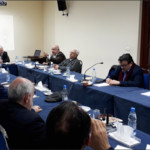
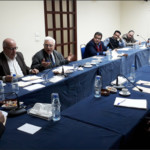
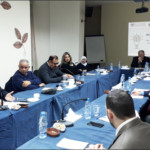
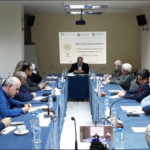
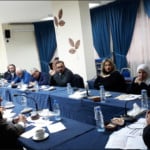
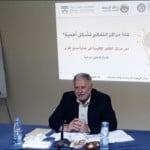

Leave A Comment